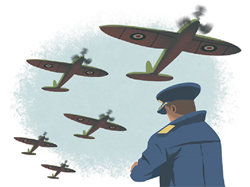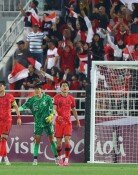Churchill and Dowding
Churchill and Dowding
Posted September. 03, 2019 07:25,
Updated September. 03, 2019 07:25

It was around 7:30 a.m. on May 15, 1940. British Prime Minister Winston Churchill received a phone call from French Prime Minister Paul Reynaud. “We’ve been defeated. We’ve lost the battle,” he said. The battle was over, but the war wasn’t because France didn’t give up. Reynaud asked for more backups from Britain. Among many, France desperately needed fighter jets. The frontline was compromised by German tanks’ blitzkrieg, and France must have figured a way out by resorting to the power of flying eagles to stop the tanks.
Back then, the British military had already dispatched 474 fighter plans for France, and they had talked about the potentially horrible consequences to additional dispatching. The British cabinet agreed to send forth four battalions, but Churchill stepped in and eventually decided to send 10 battalions. It was a decision that ate him inside and he followed the advice from Air Chief Marshal Sir. Hugh Dowding by keeping 25 battalions fighter jets at home for the defense of his country, Churchill said later in his memoir.
In fact, Dowding originally claimed 50 battalions at home, not 25. He argued that he cannot even allow dispatching four battalions before securing 50 battalions for Britain. Dowding lost the debate but won in the battle against the German air force. The victory was attributable to his stubborn struggle as well as his character that defies any political pressure from superiors and even fights back when it comes to his field of expertise.
Before and after the debate, Dowding always stayed unswerving in the face of the criticism, obstruction, and the opposition from politicians and many other people. What is even more remarkable, however, is the fact that his superiors, who hated him and disapproved of his attitude, kept his post during war. Michael Korda, former editor-in-chief of Simon & Schuster and the author of “With Wings Like Eagles,” concludes that Germany lost the battle not because it lacked a commander like Dowding, but because it lacked a leader and a social system who could embrace such a commander.
Headline News
- Med professors announce intention to leave hospitals starting Thursday
- Bridge honoring Sgt. Moon Jae-sik unveiled in Pennsylvania
- Chief of Staff Chung tells presidential secretaries to stay away from politics
- US FTC bans noncompete agreements
- N. Korea launches cyberattacks on S. Korea's defense companies







